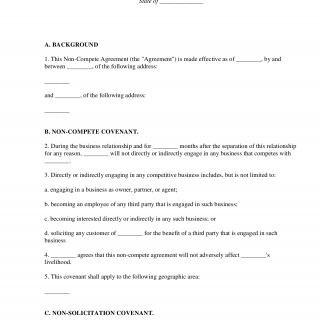Non-Compete Agreement
A Non-Compete Agreement is a document used to protect employers from partners, employees, contractors, and others who have access to their business secrets and practices using this access to leave a company and start their own competing business in the same industry. Non-competitive agreements are most often used in highly competitive industries such as technology development, sales, and marketing.
Common situations that require the use of a non-competitive agreement include the following:
- An individual who sells their business and agrees not to compete with the new business owner for a certain period of time
- Business partners terminate business relationships
- A company and a contractor or consultant ending their business relationship, and a company wishing to ensure that the consultant does not use their previous access to business secrets to help the company's competitors
- An employee who is hired to work for the company and a company that wants to ensure that if the employee leaves, they do not use their access to business secrets to create a competing company
An agreement is usually made at the end of a business relationship, but can also be created at the beginning of a business relationship as a condition of employment. In exchange for entering into an Agreement, the non-competitive party must receive some form of compensation, known as compensation. Consideration may be either a promise of employment or monetary compensation to be paid by the protected party to a non-competitive party.
How to use Non-Compete Agreement
This Agreement specifies the duration of non-competitive competition, the geographical location in which the non-competitive party should avoid competition, and the subjects, industries, and activities covered in which the non-competitive party should not participate while the Agreement is in force.
The non-competitive agreement contains the following essential elements:
- Participating parties - names and addresses of both the non-competing party (the party that is being asked not to participate in the competition) and the protected party (the party that requires that the competition is not held).
- Term of the agreement - the period of time during which the non-Contracting party should not compete with the protected party. To ensure compliance with this deadline, this period must be reasonable, taking into account the business interests of each party. Courts are generally hesitant to restrict a non-competitive party's access to economic activity, so the shorter the time period, the more likely it is that it will be enforced in court.
- Geographical range of the agreement - the geographical area in which a non-competitive party is prohibited from competing with the protected party. To ensure compliance with this geographical area, the area where the protected party operates and has its own market must be restricted. The geographical area should be as narrow as possible in order to reasonably meet the objectives of protecting the protected party from competition.
- Specific activities and items included in non - competitive activities-a detailed description of the activities and industries in which the non-competitive party should not participate under this Agreement. Prohibited actions should be limited to those that are important to the business practices of the protected party.
- Compensation - the Form and / or amount of compensation that a non-competitive party will receive in exchange for entering into an Agreement. To ensure performance, a non-competitive party must receive some form of compensation, also known as compensation, in exchange for entering into an Agreement. This compensation can range from a job offer to monetary compensation and a promotion to an alternative form of compensation such as stock options.
This Agreement also offers additional provisions that prohibit a non-competitive party from behaving, such as encouraging clients and clients of the protected party or encouraging current employees of the protected party to leave their jobs and come to work for the non-competitive party. As with all other parts of non-competitive competition, these provisions should be limited in time and scope so that they can be applied reasonably by the court in the event of a dispute.
Applicable law
Non-competitive agreements are subject to state law and are interpreted and applied differently from state to state. In some States, are allowed a wider non-competitive agreements, while other States apply the agreement only with considerable time and geographical constraints. Notably, California courts will only enforce non-competitive agreements in situations involving the sale of a business from one party to the other. You should consult state law to make sure that the Agreement will be fully effective in that state.

